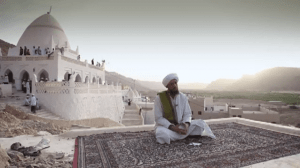Fasting for Love: Habib Kadhim’s Ramadan Message #Fast4Love
Note: This is a translation of the Arabic video from the Fasting for Love webinar
In the name of Allah, the Most Merciful, Most Compassionate. All praise belongs to Allah, Lord of the worlds. And peace and mercy be upon the most noble of prophets and messengers: our master and beloved, our Prophet Muhammad, and upon his good and pure family and elected companions—and upon all those who follow them with excellence until the Day we meet You, O Lord of the worlds. And may we be included among them and with them through His mercy. Truly, He is the Most Merciful and the Most Generous.
To proceed:
Among the greatest of Allah’s favors—Glorious and Exalted—upon His Muslim slave, and from the greatest blessings of this glorious religion is when a Muslim actualizes their love for Allah and for His Messenger (peace and mercy of Allah be upon him, his family, and companions). This refined sense of love for the Generous Lord and His great Prophet is the spirit of this religion and the spirit of acts of worship, and it is an individual obligation upon every male and female Muslim. A Muslim must reach the levels of love for Allah and His Messenger. And Our Prophet (peace and mercy of Allah be upon him) prescribed sayings, actions, and traits that allow a Muslim who follows his Sunna to reach the reality of this lofty degree of faith and highly sanctified state of loving Allah the Glorious and Majestic, and to what is greater than that, which is Allah—Glorious and Exalted—will love him. Many Quranic verses and Prophetic narrations indicate this trait of belief in the hearts of the Muslims from the Ummah of the Prophet Muhammad (peace and mercy of Allah be upon him). The most significant and easiest path that allows the Muslim man and Muslim woman to reach the love of Allah and His Messenger is following the Prophet. As our Lord informed us in His Wise Book by His saying—Glorious and Majestic: “Say [O Prophet], ‘If you love Allah, follow me, and Allah will love you and forgive you your sins; Allah is most forgiving, most merciful.’” When we reflect on this tremendous Quranic description, which is full of mercy and compassion for Allah’s servants, our Lord informs us that if we want His love—Majestic and Exalted is He—then we must follow the Prophet Muhammad (peace and mercy of Allah be upon him) according to our ability, for each and every Muslim man and woman in their environment or their home.

Attaining the Love of Allah
When we ponder the Quran, our Lord—Glorious and Exalted—informs us that the relationships that exist between the Muslim and those around him or the way a Muslim interacts with others in general, that these relationships could prevent or delay one from attaining the love of Allah. Positive relationships rooted in one’s faith that a Muslim has with his father, relatives, spouse, and the environment he lives within—could help one reach this exalted and refined love of Allah. As Allah the Glorious and Exalted says, “Say [Prophet], ‘If your fathers, sons, brothers, wives, tribes, the wealth you have acquired, the trade which you fear will decline, and the dwellings you love are dearer to you than Allah and His Messenger…then wait…’” So we see these as obstacles that could delay one from attaining the love of Allah the Exalted and His Messenger (peace and mercy of Allah be upon him, his family, and companions). On the other hand, these relationships can be rooted in faith, radiant, and positive, thereby assisting one in attaining Allah’s love. For a Muslim to have a good relationship with his or her parents is a way to attaining Allah’s love and the love of His Messenger (peace and mercy of Allah be upon him, his family, and companions)—
In this brief lesson, we exhibit this great attribute of faith and lofty goal that every Muslim should strive to actualize in their lives and seek from their Lord the Exalted, as we’ve been taught by the Prophet (peace and mercy of Allah be upon him). Every Muslim should make it a goal in their lives to reach this refined level of love for Allah and His Messenger so that the moment of death does not come to him and he is lowered into his grave except that he is a lover of Allah and His Messenger.
A Lover of Allah and His Messenger
The first means that helps one attain this love is following the Prophet (peace and mercy of Allah be upon him, his family, and companions)—on blessed days, such as Ramadan and other sacred months, and throughout the year. For in these seasons, acts of righteousness have greater blessing, reward, and effect on the heart of the Muslim. This occurs in Ramadan, the sacred month and the month in which the Prophet (peace and mercy of Allah be upon him, his family, and companions) was born. Therefore, firstly, a Muslim must have the lofty goal in this life, through the effects of righteous actions, to attain the love of Allah and His Messenger and not leave this world or enter his grave without being a lover of Allah and His Messenger. When a Muslim actualizes this attribute, death comes to him, and he yearns and loves to meet Allah, and Allah loves to meet him.
 How does one attain this?
How does one attain this?
There are a number of means and actions that the Prophet prescribed for us to do and taught us that if we perform, we will attain the love of Allah the Glorious and Exalted. This means that we will love Allah the Exalted—and greater than that, Allah the Exalted will love us. Among what the Prophet prescribed are qualities we need to actualize—if we actualize these qualities, then Allah the Exalted will love us. From what he prescribed, we need to perform actions, and if we perform them, then we attain the love of Allah. Other means prescribed are statements we must say and repeat abundantly so that their lights and blessings reach our hearts, which then help us reach the love of Allah the Glorious and Majestic, and we become beloved to Allah. Also, pay attention to how a Muslim cannot truly love Allah until Allah the Glorious and Exalted loves him. Our Lord the Exalted says, “You who believe, if any of you go back on your faith, Allah will soon replace you with people He loves and who love Him.” Look, O Muslim, how Allah mentioned His love for His servants before mentioning their love for Allah because a person cannot truly love Allah until Allah the Glorious and Exalted loves them.
Who is Al-Tawwab?
A person cannot remember Allah until Allah reminds them. A person cannot turn to Allah until Allah turns towards them. Or, to put it another way, they cannot turn to Allah until Allah manifests Himself with His Name, Al-Tawwab, so then the lights of repentance and regret take place in the person’s heart, so they turn back to Allah, and they take the means of turning to Him through saying, “Astaghfirullah.” Our Lord says at the beginning of Surat Hūd, “Ask your Lord for forgiveness, then turn back to Him. He will grant you wholesome enjoyment.” So, one reaches the station of turning to Allah by having a foothold in seeking Allah’s forgiveness. And in the station of turning to Allah, one attains the fruits of love through actualization. As our Lord has told us—Glorious and Exalted, “Allah loves those who turn to Him, and He loves those who keep themselves clean.”
So we can summarize this great and vital subject within the religion, love of Allah and His Messenger (peace and mercy of Allah be upon him), by taking the means to it. What is the most important means to it? Following the Messenger (peace and mercy of Allah be upon him) as indicated by the Quranic text. Another aspect of this love is that Allah will love you, and if Allah loves you, you will know some of the meanings of your shared love for Him as well, O Muslim.
 An Immense Ocean
An Immense Ocean
Another means is certain statements that we can utter. The Prophet (peace and mercy of Allah be upon him, his family, and companions) tells us some of the beloved statements to Allah in authenticated hadiths. What does it mean that Allah beloves these statements? Whoever abundantly says these statements becomes beloved to Allah and helps one reach the love of Allah. The explanation of the love of Allah is a broad and lengthy subject; it is an immense ocean, to which Imam Al-Ghazali has dedicated an entire book within his great work Ihya Ulum Al-Deen, called the “Book of Love, Intimacy, Longing, and Contentment” due to the subtleties of this love and its difficulty for some people to understand. Some scholars even denied this kind of love and said, “Love is obedience. By obeying Allah, fulfilling the obligations and voluntary act of worship is love!” They denied that there are any other refined feelings that a believer would feel towards Allah the Exalted. It is more refined than the feelings a man has for his wife, greater than the feelings a parent has for his children, and greater than any other feelings of love one may have for people. It is a refined love rooted in transmission and intellect, in the Quran and the Sunna, and in the lives of the Companions of the Prophet Muhammad (peace and mercy of Allah be upon him, his family, and companions). Love of Messenger (peace and mercy of Allah be upon him, his family, and companions) was clear and simple, and during the lives of the noble Companions, all their hearts, both men and women, were overflowing with love. What might be difficult for some to understand is the love of Allah the Glorious and Exalted, but when we read the Quran with deep reflection, we find that this love is rooted in the Book of Allah the Exalted. We see this in the verse from Surat Al-Ma’idah in which Allah the Exalted says, “You who believe, if any of you go back on your faith, Allah will soon replace you with people He loves and who love Him.” This verse confirms that there are people who love Allah and whom Allah the Exalted loves.
Reflect & Follow
So the way to reach this love is through reflection upon the verses of the Quran and through following the Sunna of the Prophet Muhammad (peace and mercy of Allah be upon him) in all times and periods, especially during the seasons of goodness when righteous acts bear more fruit, bring greater reward, and have a more immediate effect on the heart of the believer, such as the sacred months, as we mentioned, and during the great month of Ramadan.
Firstly, we should ponder the qualities mentioned: “Allah loves those who turn to Him, and He loves those who keep themselves clean.” “Allah loves those who act with excellence.” We find that there are qualities, and if a member of the Ummah actualizes them, Allah will love them, whether they are a Muslim man or a Muslim woman. Whoever actualizes the quality of excellence (ihsan): perfecting worship, perfecting obedience, and perfecting everything beloved to Allah the Exalted.
Repentance: whoever continuously turns towards Allah becomes beloved of Allah.
Purity:
Whoever remains in a state of purity, whether inward or outward purity, purifying the heart from dishonesty, hatred, pride, and vanity—corrupts a person’s relationships with those around him and nullifies righteous deeds with Allah. We cannot have pride because it belongs to Allah the Glorious and Majestic. The way of the servant and humanity is humility, and we are all servants of Allah or slaves. Those who are upon the Way of Prophecy are called servants, and those who stray from the Way of Prophecy are called slaves in the Quran. As your Lord the Glorious and Exalted says, “Your Lord is never unjust to His slaves.” So, we must actualize the qualities mentioned.
Subhan Allah wa bi hamdihi, Subhan Allah al-adheem
Then, we must abundantly say the words beloved to Allah: Subhan Allah, Al-hamdu lillah, and la ilaha illa Allah, and Allahu Akbar. “The most beloved statements to Allah are four,” the Prophet (peace and mercy of Allah be upon him) said, “Subhan Allah, Al-hamdu lillah, la ilaha illa Allah, Allahu Akbar. There is no harm in starting with whichever you choose.” He also said, “Two statements that are beloved to the Most Merciful, easy on the tongue, weighty on the scales: Subhan Allah wa bi hamdihi, Subhan Allah al-adheem.” These are two great statements whose effect on the believer’s heart is immense in illuminating the heart and actualizing the love of Allah and Allah’s love for him.
Additionally, abundantly reciting Surat Al-Ikhlas. It has come in narration that the Prophet (peace and mercy of Allah be upon him) said about a man who would recite Surat Al-Ikhlas abundantly, “Tell him that Allah the Exalted loves him.” Therefore, we should recite it in abundance.
We should send invocations of Allah’s peace and mercy upon the Prophet (peace and mercy of Allah be upon him).
Beyond Ramadan
We should not allow our following the Sunna and worship only to be limited to the great month of Ramadan. We should follow even the detailed aspects of the Sunna in Ramadan, for there are Sunnas specific to Ramadan, such as breaking our fast by eating dates or praying Taraweeh. If a person follows even these specific Sunnas—like eating an odd number of dates when breaking one’s fast in Ramadan or praying the Witr prayer—then this person will attain the secrets of this religion, like the Night of Great Worth (Laylat Al-Qadr) because his heart will then be prepared to attain the blessings of Laylat Al-Qadr. He breaks his fast on an odd number of dates and prays the Witr prayer and Laylat Al-Qadr comes on one of the odd nights. So following the Sunna of the Prophet (peace and mercy of Allah be upon him) in all seasons, and especially during the sacred months and Ramadan, has the fastest effect on the heart of the individual until his heart experiences the love of Allah and the greatness of these acts of worship. He will experience Allah’s love for him and Allah’s being with this person.
Ameen.
We ask Allah that He actualizes us and this Muslim Ummah in love of Allah the Glorious and Exalted and that He makes us of those beloved to Allah and followers of the Prophet (peace and mercy of Allah be upon him). And that we worship Allah in all states and not, like some people who worship Allah in Ramadan and follow the Sunna in Ramadan, but when Ramadan is over, he forgets the Sunna of the Prophet (peace and mercy of Allah be upon him). The statement applies to this kind of person: “Whoever worships Ramadan, Ramadan has ended. And whoever worships the Lord of Ramadan, He is Everlasting and never fades.” So the Lord we worship in Ramadan, He is the same outside of Ramadan; and our Prophet whose Sunna we give life to in Ramadan, we should give life to the outside of Ramadan. We ask Allah that He prepares our hearts for this exalted love and that He gives us felicity through it in this life, and in the hereafter after death, and in Paradise with our Prophet (peace and mercy of Allah be upon him) and the elect of Allah’s righteous servants, and all praise belongs to Allah.


